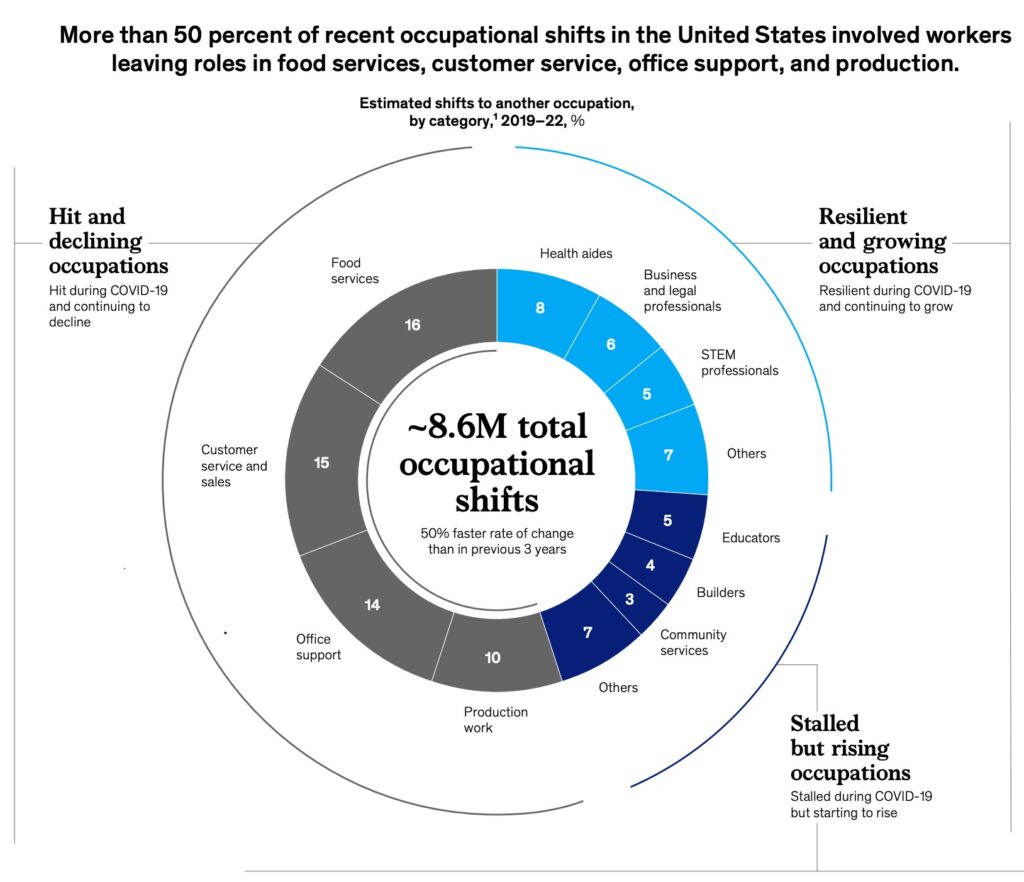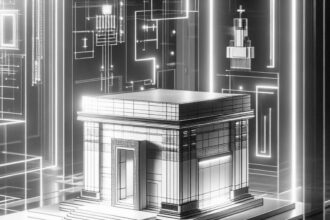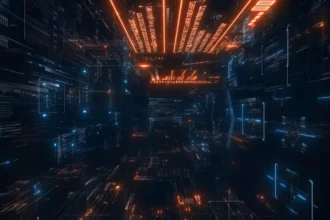There’s a common topic haunting all our minds nowadays; will AI ever replace us? The answer is….What’s AI? Since when did it exist? And why is it evolving so fast? Will it, ever, replace our jobs?
The key question is whether the revolution in the labor market due to the impact of artificial intelligence will lead to a similar result. AI is a general-purpose systemic technology not unlike electricity and will eventually cross over and invade every aspect of our economy and society.
Considering the ease and comfort it brings, people are open to incorporating artificial intelligence into different aspects of their daily lives. However, the transition is very gradual, and it might take several years until artificial intelligence completely takes over your job.
However, even with rapid growth and innovation in AI and genAI, there are some jobs that aren’t going anywhere, even with such huge investment in AI. Therefore, I decided to curate a list of the safest jobs from AI, which includes the jobs that AI cannot replace, today and in the near future.
Table of Contents
ToggleTop 41 Jobs that are safe from AI
Some folks are slightly worried about the future of their careers. Meanwhile, others are barely breaking a sweat. Certainly, there are jobs that are likely to be difficult for AI to replace due to their complex nature, the need for human intuition, emotional intelligence, and creativity. These jobs not only will advance even more with the help of AI but also will still require human oversight and improvement, including the improvement of AI itself. Here is a list of the safest jobs in 2025 and beyond:
| Job Title | Reason Why It’s Safe from AI |
|---|---|
| Plumber | AI cannot perform complex manual tasks and deal with unpredictable physical environments like fixing leaks. (Ai is not going to fix that Leaking shitter, right?) |
| Electrician | Requires manual dexterity and decision-making in unique situations that AI cannot replicate effectively. |
| Mental Health Professional | Human empathy and understanding are crucial, aspects AI cannot genuinely replicate to the satisfaction of those in need. |
| AI Re-enforcement Learning Trainer | Teaching AI requires human intuition and adjustments that AI cannot self-generate effectively yet. |
| Pilot | While AI can operate flights, complex decision-making and emergency handling require human presence. |
| Massage Therapist | Physical touch and adaptability to individual needs are something AI cannot replicate authentically. |
| Dentist | Requires precision and adaptability to various physical conditions, beyond AI’s current capabilities. |
| Nurse | Human care, empathy, and adaptability in dynamic environments are essential and difficult for AI to undertake. |
| Surgeon | Highly skilled and requires real-time decision-making in surgery, a complex environment challenging for AI. |
| Nurse Practitioner | High level of specialized medical knowledge and personal patient care that AI cannot replicate. |
| Choreographer | Requires creativity and a deep understanding of human emotion and physicality which AI lacks. |
| Physician Assistant | Combines high-level medical skills with patient empathy, something difficult for AI to fully replicate. |
| Mental Health Counselors | Deep understanding of human psychology needed, coupled with the ability to provide comfort and empathy. |
| Physical Therapists | Need for physical touch and tailored therapy based on individual patient responses, which AI cannot provide. |
| Occupational Therapists | Requires adaptable problem-solving and interaction that adjusts to patient-specific needs and conditions. |
| Art Therapists | Requires creative expression tailored to individual emotional and psychological needs. |
| Music Therapists | Depends on real-time human interaction and adaptation to individual responses to therapy. |
| Social Workers | Needs empathy, ethical judgment, and interpersonal skills to manage complex social situations. |
| Education Administrators | Role involves leadership, policy interpretation, and personal interactions that AI can’t replicate. |
| Emergency Medical Technicians | Quick real-time decision-making in emergency situations where adaptability is critical. |
| Firefighters | Physical bravery and decision-making in unpredictable, hazardous environments. |
| Dermatologists | Requires nuanced medical judgment and personal interaction for diagnosis and treatment. |
| Orthopedic Surgeons | Specialized surgical procedures require hands-on expertise and adaptability to patient-specific cases. |
| AI Specialists and Developers | Essential for creating, updating, and refining AI systems, which requires advanced technical skills and creativity. |
| Data Scientists and Analysts with Domain Expertise | Deep understanding of specific fields required to interpret data accurately, something AI alone cannot achieve. |
| User Experience and Human-Computer Interaction Specialists | Focus on optimizing how humans interact with AI systems, requiring empathetic and psychological insights. |
| Creative Professionals Collaborating with AI Tools | Use AI as a tool to enhance creative outputs, leveraging unique human creativity that AI can’t replicate. |
| AI Ethics Officer | Ensures AI systems uphold ethical standards and human values, a role requiring nuanced human judgment. |
| Data Privacy Specialist | Expert in protecting and managing data privacy, a critical area as AI systems handle sensitive information. |
| AI-Assisted Healthcare Provider | Combines AI tools with human medical expertise to provide patient care that AI alone cannot offer. |
| AI Implementation Strategist | Designs strategies for AI integration into business processes, requiring both technical skills and strategic planning. |
| Professional Athlete | Requires physical skills, competitive spirit, and human unpredictability that AI cannot emulate. |
| Psychotherapist | Dependent on human empathy, trust-building, and understanding of complex human emotions. |
| Event Planner | Needs human creativity and the ability to manage unpredictable scenarios and client preferences. |
| Chief Executive Officer | Involves strategic decision-making, leadership, and negotiation that require a human touch. |
| Social Media Manager | Requires understanding of human cultural trends, creative content creation, and interaction. |
| Human Resources Manager | Centers on interpersonal relationships, conflict resolution, and organizational culture that AI cannot fully grasp. |
| Art Director | Relies on visual creativity, trend interpretation, and human emotional response to art. |
| Special Education Teacher | Requires adaptability, empathy, and specialized approaches to individual learning needs. |
| Cultural Heritage Conservator | Involves the preservation of artifacts and knowledge that requires a deep understanding of history and culture. |
| Environmental Scientist | Fieldwork and the application of complex ecological knowledge are essential, requiring human analysis and decision-making. |
Read also : Top 3 Essential Strategies to Bypass AI Detection in 2024
This list is not exhaustive and is provided only for educational purposes. Based solely on my predictions and research.
The jobs safest from AI and automation are ones that require human qualities that a robot cannot replicate, such as social skills, emotional intelligence, and interpersonal relationships. Fields that are more creative and don’t stick to a rigid routine will also lower the risk of AI replacing jobs in that field.
How many jobs will ai replace by 2030
By 2030, artificial intelligence (AI) is projected to have a significant impact on job markets globally. According to a Goldman Sachs report, AI could replace the equivalent of 300 million full-time jobs worldwide, affecting about a quarter of work tasks in the US and Europe. However, it’s also expected to create new jobs and lead to a productivity boom.
The net effect could increase global economic activity by around $13 trillion, or about 16% higher cumulative GDP compared to today. This transformative impact will be driven by labor substitution through automation and innovation in products and services, highlighting the dual nature of AI’s influence on employment.

Trending now > ChatGPT: The Ultimate Guide to DAN Jailbreak Prompts (DAN 6.0, STAN, DUDE, and the Mongo Tom)
So by 2030, AI is expected to significantly reshape the job landscape, automating up to 30% of tasks currently performed in the US economy. This could lead to the displacement of millions of jobs, particularly in roles characterized by repetitive tasks such as data entry, telemarketing, and assembly line work. However, the automation driven by AI also presents opportunities to create new jobs and enhance productivity in various sectors. While lower-skilled jobs face a higher risk of automation, roles requiring creativity, emotional intelligence, and complex problem-solving are likely to remain more secure and resistant to automation pressures. As the workforce transitions, adaptability and skill development will be key to navigating the future job market impacted by AI advancements
AI isn’t replacing humans today
If AI were able to perform all of the tasks that are currently performed by humans, it is unlikely that businesses would completely eliminate human workers. Businesses still need humans to set strategy, make decisions, and oversee operations. It is likely that AI will automate many of the tasks that are currently performed by humans. However, it is unlikely that AI will completely replace human workers in the workforce. AI will likely be used to augment human workers and make them more productive, rather than replacing them altogether.
AI Should Augment Human Intelligence, Not Replace It. Will smart machines really replace human workers? Probably not. People and AI both bring different abilities and strengths to the table. The real question is: how can human intelligence work with artificial intelligence to produce augmented intelligence?
AI will not replace you, but the person using AI will.
Indeed, Tech experts don’t believe AI will replace people is because it gains knowledge differently than humans. “Generative AI and machine learning techniques are very heavily based on correlation, as opposed to causation” Justin Lewis, BP’s vice president of incubation and engineering, said Thursday during a panel discussion at the AI Summit New York 2023.
One of the main reasons why AI cannot replace human beings is the lack of creativity. Humans possess a unique ability to think creatively and come up with new and original ideas. Creativity is a complex human trait that is influenced by various factors such as emotions, culture, and experiences.
It involves thinking outside the box, exploring new ideas, and taking risks. While AI can analyze data, identify patterns and trends, and even generate new ideas based on existing data, it lacks the ability to think outside the box and come up with truly original and creative ideas. AI relies on pre-programmed algorithms that limit its ability to think creatively.
Moreover, just as the internet has drastically lowered the cost of information transmission, AI will lower the cost of cognition. That’s according to Harvard Business School professor Karim Lakhani, who has been studying AI and machine learning in the workplace for years. As the public comes to expect companies that deliver seamless, AI-enhanced experiences and transactions, leaders need to embrace the technology, learn to harness its potential, and develop use cases for their businesses.




